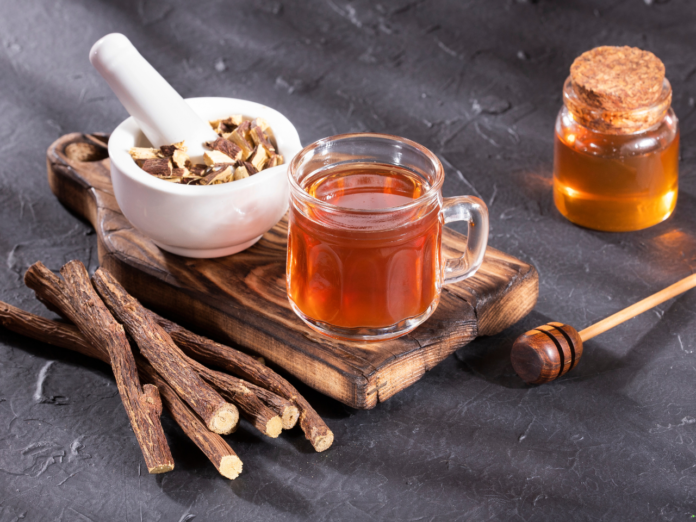Is licorice root safe during pregnancy? This question often pops up among expecting mothers. Licorice root has been used for centuries for its health benefits, but its safety during pregnancy is a hot topic. Some studies suggest licorice extract supplementation may lead to complications, while others highlight black licorice’s potential advantages. Understanding the effects of licorice root in pregnancy is crucial for making informed choices.
This post will dive into the risks and benefits of using licorice root while pregnant. We’ll explore how it can affect both mother and baby. By the end, you’ll have a clearer picture of whether this herbal remedy fits into your pregnancy journey.
Key Takeaways
- Licorice root is a natural herb that may have both benefits and risks during pregnancy, so understanding its effects is crucial.
- Pregnant women should be cautious as licorice root can lead to complications like high blood pressure and hormonal imbalances.
- It’s essential to consult with a healthcare provider before using licorice root or any herbal supplements during pregnancy.
- Limiting or avoiding licorice root is generally recommended to ensure the safety of both the mother and the developing baby.
- Always read labels carefully, as some products may contain higher levels of licorice root than expected.
- Stay informed about the latest research and guidelines regarding herbal supplements during pregnancy for better health outcomes.
What is Licorice Root
Plant Description and Origin
Licorice root comes from a perennial plant known as Glycyrrhiza glabra. This plant is native to Europe and Asia. Ancient cultures have used licorice roots for thousands of years. Egyptians valued it for its medicinal properties. Traditional Chinese medicine also incorporated licorice in various remedies.
The key component in licorice root is glycyrrhizin. This active compound gives licorice its sweet flavor. It also contributes to many of its health benefits. Glycyrrhizin has anti-inflammatory and antioxidant properties, making it useful in herbal remedies.
Common Medicinal Uses
Licorice root serves several medicinal purposes. Many people use it for digestive issues like heartburn and indigestion. It can help soothe the stomach lining and promote digestion. Licorice also aids in treating respiratory ailments such as bronchitis. Its anti-inflammatory properties help reduce throat irritation.
e throats and coughs can benefit from licorice root as well. The soothing effect of the extract helps ease discomfort. Many herbal teas contain licorice extract for this reason. Skin conditions like eczema and psoriasis may improve with topical applications of licorice.
Overall, the versatility of the herbal remedy licorice root makes it popular for general wellness. People often consume it in teas or supplements to enhance their health.
Forms and Consumption Methods
Licorice is available in various forms. Dried root, extracts, and teas are common options. Each form offers unique ways to include licorice in your diet. Infusions made from dried roots are popular for home remedies.
Capsules containing licorice extract provide a convenient alternative. They offer precise dosing without the need for preparation. When choosing licorice products, quality matters greatly. High-quality licorice ensures safety and effectiveness.
rcing products from reputable suppliers is essential. This helps avoid contamination or low-quality ingredients that could be harmful.

Effects on Pregnancy
Potential Benefits and Risks
Licorice root has some potential benefits. It may offer anti-inflammatory effects. This can be helpful for conditions like eczema. Antioxidant properties in licorice may also support overall health. However, excessive consumption poses risks. High intake can lead to hypertension. This condition raises blood pressure levels, which is dangerous during pregnancy. Pregnant women should practice moderation to avoid adverse health effects.
Health Concerns for Pregnant Women
Pregnant women must be cautious with licorice consumption. Studies have linked licorice intake to serious complications. One significant concern is stillbirth. Research indicates that high levels of licorice can negatively affect fetal development. Hormones in licorice, especially aldosterone, may contribute to issues like water retention and elevated blood pressure. Consulting healthcare providers before using licorice is essential. They can provide personalized advice based on individual health needs.
Research Findings and Studies
Research highlights the impact of licorice on pregnancy outcomes. Some studies show a correlation between licorice consumption and increased blood pressure in pregnant women. This rise in blood pressure can harm both the mother and the fetus. Other research focuses on licorice’s estrogen-like activity. This activity may disrupt hormonal balance during pregnancy. Such disruptions could lead to complications for both mother and child.
The evidence suggests caution is necessary when considering licorice root during pregnancy. While it may have some benefits, the potential risks outweigh them for many women. Ongoing studies continue to evaluate its safety and effects on fetal development.
Risks and Precautions
Possible Health Interactions
Licorice root can interact with medications often used during pregnancy. For example, it may affect the effectiveness of certain blood pressure medications. Pregnant women should be aware that licorice can disrupt hormonal balance. This disruption can lead to increased blood pressure, which poses risks to both mother and baby.
Caution is necessary when combining licorice with other herbal supplements or treatments. Many herbs can amplify the effects of licorice, leading to unexpected health issues. Always check with a healthcare provider before mixing treatments.
General Safety Guidelines
Experts recommend avoiding licorice for longer than 4 to 6 weeks during pregnancy. Extended use increases health risks significantly. Pregnant women should monitor their bodies for any adverse reactions if they consume licorice. Symptoms like headaches or high blood pressure may indicate a problem.
Safety should be the top priority during pregnancy. Consulting healthcare professionals is crucial before using licorice or any supplement. They can provide guidance tailored to individual health conditions.
Expert Recommendations
Many experts advise against using licorice during pregnancy and breastfeeding. The potential risks outweigh any benefits it might offer. Alternatives exist for managing symptoms typically treated with licorice, such as coughs or digestive issues.
Pregnant women should explore safer options with their healthcare providers. Individualized care is essential for maintaining health during this critical time. Professional guidance ensures that mothers make informed decisions about their treatment options.
Guidelines for Pregnant Women
Dosage and Usage Tips
Licorice root can pose risks during pregnancy. Pregnant women should avoid high doses. For non-pregnant adults, a common recommendation is no more than 2-4 grams of licorice root per day. This amount helps prevent toxicity. Self-medicating with licorice is not advised. Consulting a healthcare professional is essential before using it.
Keeping a journal can help track any symptoms or side effects from licorice consumption. Note any changes in mood, energy levels, or physical symptoms. This information can be valuable for discussions with healthcare providers.

Alternative Remedies to Consider
Pregnant women can explore safer herbal alternatives. Ginger is known for easing nausea and digestive issues. Chamomile also provides relief for digestive discomfort. Both options are generally considered safe during pregnancy.
For sore throats, honey, and lemon work well together. They provide soothing effects without the risks associated with licorice. Honey has natural antibacterial properties. Lemon adds vitamin C, which supports the immune system. Always consult a healthcare provider before trying new remedies during pregnancy.
Situations to Avoid Licorice
Certain health conditions make licorice use risky. Individuals with high blood pressure should avoid it completely. Licorice can elevate blood pressure and lead to complications. Those with heart conditions must also steer clear of this herb.
Hormonal imbalances present another reason to avoid licorice. It can affect hormone levels, causing further imbalances. Pregnant women experiencing hormonal fluctuations should not use licorice.
Combining licorice with specific medications can be dangerous as well. It may interact negatively with blood thinners or diuretics. Always seek medical advice before mixing herbs with prescribed medications.
Closing Thoughts
Licorice root can be a tricky subject during pregnancy. While it has some benefits, the risks often outweigh them. You need to be cautious and informed. The potential effects on your pregnancy are significant, so understanding guidelines is crucial.
Always consult with your healthcare provider before adding anything new to your routine. Your health and your baby’s safety should come first. Stay informed, stay safe, and make choices that support your well-being during this important time. Take charge of your pregnancy journey by educating yourself further on licorice root and its implications.
Frequently Asked Questions
Can I consume licorice root during pregnancy?
It’s best to avoid licorice root during pregnancy due to potential risks. It may affect hormone levels and fetal development.
What are the effects of licorice root on pregnancy?
Licorice root can lead to complications such as high blood pressure and low birth weight. Its glycyrrhizin content may disrupt hormonal balance.
Are there any safe alternatives to licorice root in pregnancy, considering glycyrrhizin exposure and the active compound glycyrrhizin?
Yes, consider herbal teas like ginger or peppermint. Always consult your healthcare provider before trying new remedies.
How much licorice root is considered unsafe during pregnancy?
Even small amounts can pose risks. It’s advisable to avoid it entirely during pregnancy for safety.
What should I do if I’ve consumed licorice root while pregnant?
If you’ve consumed licorice root, consult your healthcare provider immediately for guidance and monitoring.
Are there any benefits of licorice root that apply during pregnancy?
While licorice root has anti-inflammatory properties, its risks outweigh the benefits during pregnancy. Focus on safer alternatives.
Is it safe to use licorice root in herbal supplements while pregnant?
No, most herbal supplements containing licorice root are not recommended during pregnancy due to possible adverse effects. Always check labels and consult a doctor.




